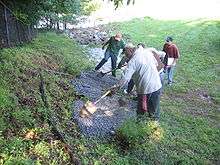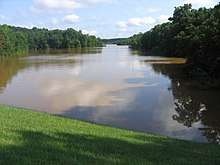Lake Needwood
Lake Needwood is a 75-acre (300,000 m2) reservoir in Derwood, Maryland, United States. Located east of Rockville, in the eastern part of Montgomery County, it is situated on Rock Creek. The lake was created by damming Rock Creek in 1965 with the goal of providing flood control and reducing soil erosion.[2][3] Lake Needwood also protects the water quality of the creek by functioning as a retention basin to trap sediment from storm-water runoff.
| Lake Needwood | |
|---|---|
May 2006 | |
| Location | Derwood, Maryland |
| Coordinates | 39.121238°N 77.129388°W |
| Type | reservoir |
| Primary inflows | Rock Creek |
| Primary outflows | Rock Creek |
| Catchment area | 12.8 sq mi (33 km2) |
| Basin countries | United States |
| Surface area | 75 acres (30 ha) |
| Water volume | 196,000,000 US gal (0.00074 km3) |
| Surface elevation | 324 feet (99 m)[1] |
The lake is part of Rock Creek Regional Park. Visitors can rent pedal boats, rowboats, and canoes, and a flat-bottom pontoon boat, the Needwood Queen, is available for rides. Also, the picnic areas surrounding the lake are popular locations for various events. Other park features include a visitors center and snack bar, hiking and biking trails, playgrounds, an archery range and Needwood Golf Course. About one mile (1.6 km) southeast is Lake Needwood's sister lake, Lake Frank.
The Rock Creek Trail begins at Lake Needwood and can be followed along the course of Rock Creek, ending at the Potomac River in Washington, D.C.
Lake Needwood Dam
Lake Needwood is a Rock Creek impoundment formed by an earthen embankment, the Lake Needwood Dam. It is made of a 65-foot (20 m) high earthen dam built on a fractured rock foundation formed at the junction of the Boulder Gneiss and Upper Pelitic Schist geological formations.[4][5] In addition to the Lake Needwood's principle spillway outlet, it has a 185-foot (56 m) wide emergency spillway originating between the Westside and the Rock Creek Trails. The dam was designed by the Natural Resources Conservation Service.[5] At the time of construction, only the right portion of the dam bottom was treated with grout, likely predisposing the structure to generate a concentrated seepage of water from the left abutment during the 2006 Mid-Atlantic United States Flood.[5] The construction of the Lake Needwood Dam was complete in 1965. The dam is owned by the Maryland-National Capital Park and Planning Commission.[6] In 2007–2008, the earthen dam underwent a $3 million repair project to install a grout curtain below the Lake Needwood Dam to decrease seepage through its rock foundation and to upgrade the outlet control tower.[7]
Habitat
Lake waters are inhabited by largemouth bass, catfish, bluegill, crappie, and trout.[8] With a license, fishing is permitted.[9] Lake Needwood serves as a temporary stop for many North American migratory birds. However, the shoreline vegetation and soil integrity have been affected by non-migratory Canada geese prompting efforts to control their population.[10]
Mid-Atlantic United States flood of 2006


There have been several evacuations of downstream residents during periods of heavy rain, due to concerns about the structural integrity of the earthen dam constructed in 1965. The latest evacuation, of approximately 2,400 people, was on June 28, 2006.[11] Communities just south of the lake were evacuated and were housed in temporary shelters at nearby high schools until the lake's level dropped. The evacuees lived in 500 apartments at the Rock Creek Terrace complex on Veirs Mill Road in Rockville and in 700 single family homes in that area. Officials stated that the lake was 25 feet (8 m) above its normal level during the flood, and many roads in the surrounding area had been closed down for fear of flooding. As the flood subsided, evacuees returned home on June 29, 2006. Montgomery County Homeland Security director Gordon Aoyagi and County Chief Administrative Officer Bruce Romer estimated that if the dam had broken, areas south of the lake could have flooded up to 19 feet (6 m).[12]
2010–2011 dredging project
Until 1990, the county government regularly conducted dredging projects of the lake to remove accumulated sediment. Dredging was then deferred for budgetary reasons. In 2008, the County started preparations to dredge sediment from the lake during 2010-2011. The dredging project aimed to improve water quality, as well as boating and fishing conditions.[13]
In October 2010, the water level was lowered by about six feet to allow more time for the sediment to dry out for dredging.[14] The shallower north end of the lake was deepened from 1–4 feet deep to 12–18 feet deep. The lake was reopened in summer 2012.[15]
Water quality
In 2010, lake waters tested positive for microcystin, a toxin produced by cyanobacteria that can cause liver damage.[16] The toxin was also reported in the water in 2012–2017[17][18] and in 2020.[19] Approximately 50 bright yellow signs are posted along trails around the lake advising patrons to keep pets away from the water.[20]
Cyanobacteria develop in the lake due to an overabundance of nutrients (nitrogen and phosphorus) in the water. In residential areas, the nutrients are generated by excessive fertilizer use and associated urban runoff, which cause harmful algal blooms (HABs) in water bodies. Higher water temperature and low circulation are contributing factors.[21][22]
See also
- Rock Creek (Potomac River)
- List of parks in the Baltimore–Washington metropolitan area
- List of lakes in the Washington, D.C. area
References
- U.S. Geological Survey Geographic Names Information System: Lake Needwood
- "Park's Staff to Run Boat Concession At Maryland's New Lake Needwood". The Washington Post. October 6, 1966. p. C16.
- "New Montgomery Dam Creates 72-Acre Lake". The Washington Post. October 21, 1966. p. B1.
- "Heavy Rain Seepage Prompts Review and Retrofit of Lake Needwood Dam". Maryland Department of the Environment. Retrieved January 7, 2018.
- Dalal, Visty P. "Lake Needwood Dam Incident - A Geological Twist!" (PDF). Association of Environmental & Engineering Geologists. Archived (PDF) from the original on January 26, 2018. Retrieved January 7, 2018.
- "Heavy Rain Seepage Prompts Review and Retrofit of Lake Needwood Dam". Maryland Department of the Environment. Retrieved January 7, 2018.
- "Department of Parks Completes Construction on Lake Needwood Dam - Montgomery Parks". Montgomery Parks. June 2, 2008. Retrieved January 7, 2018.
- "Lake Needwood Boats". Montgomery Parks. Retrieved January 7, 2018.
- "Home Page". Maryland Department of Natural Resources. Retrieved January 7, 2018.
- "Living with Geese". Montgomery Parks. Retrieved January 7, 2018.
- Aller, Hal Van. "Dodging the Bullet: Lessons Learned From Recent Dam Emergencies". Maryland Department of the Environment.
- "Rain Sets Records, Causes Huge Problems". WTOP. ] June 26, 2006. Archived from the original on June 26, 2006.
- Gazette Newspapers."Lake Needwood to be lowered." February 13, 2008.
- "Department of Parks Starts Lowering Water Level in Lake Needwood in Preparation for Dredging". Montgomery Parks. Retrieved 20 May 2019.
- Singer-Bart, Susan. "Boaters and Fishermen Rediscover Rockville Gem". Rockville Patch. Retrieved 20 May 2019.
- Liu, Mimi (2010-08-11). "Harmful algae bloom found at Lake Needwood in Derwood". The Gazette. Rockville, MD. Archived from the original on 2018-01-08.
- Chotiner, Melissa (2014-07-22). "Montgomery Parks Reports Elevated Microcystin Levels at Lake Needwood; Visitors Asked to Use Caution". Silver Spring, MD: Montgomery Parks. Archived from the original on 2018-01-08.
- "Montgomery Parks warns lake visitors about elevated levels of algae toxin". WTOP. Washington, DC. 2017-07-25.
- "Montgomery Parks Reports Signs of Microcystin at Lake Needwood; Visitors Asked to Use Caution". Montgomery Parks. 2020-08-08.
- Lewis, Kevin (2014-07-23). "Toxic algae in Montgomery County's Lake Needwood poses pet danger". WJLA. Washington, DC.
- "Harmful Algal Bloom Basics". Atlanta, GA: U.S. Centers for Disease Control and Prevention. 2020-06-03.
- "Causes of CyanoHABs". Cyanobacterial Harmful Algal Blooms in Water Bodies. Washington, DC: U.S. Environmental Protection Agency. 2019-07-17.